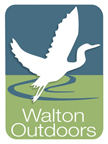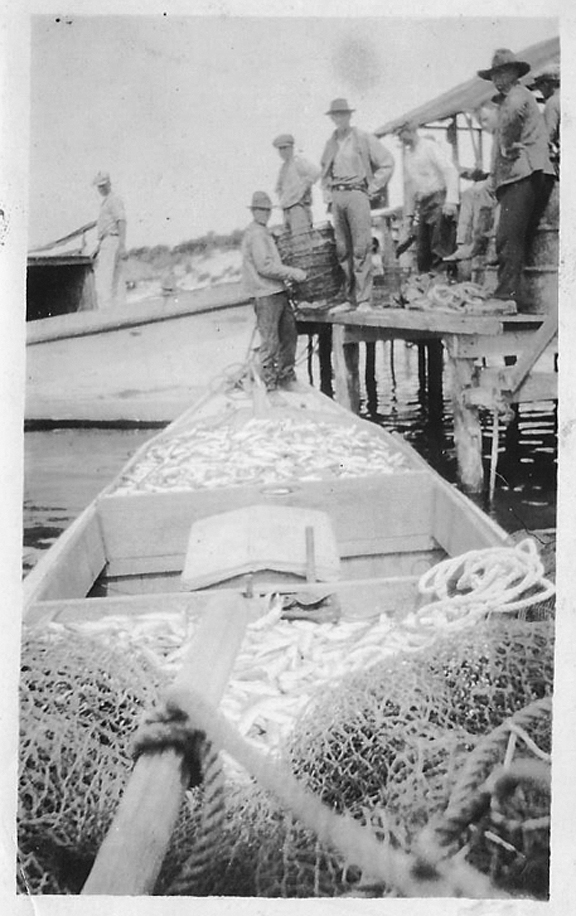By James H. Cason, Robert A. Mills, and Paula A. Tully. Interviews by Tavia Copenhaver McCuen, with special assistance from Walter Francis Spence. A publication of Northwest Florida Water Management District, Dec. 1985
The mission of the Northwest Florida Water Management District is to implement the provisions of Chapter 373, Water Resources, Florida Statutes, in a manner that best ensures the continued welfare of the residents and water resources of Northwest Florida. Their core mission is to ensure a clean and adequate supply of water for the people and natural resources of the region; working to protect, maintain, and improve the quality of resources across the panhandle; promote flood protection through non-structural techniques; and protect and improve natural systems in Northwest Florida through land acquisition, management, and ecosystem restoration activities.
Northwest Florida Water Management District (District) has conducted several scientific studies of the Choctawhatchee Bay by investigating temperature changes, ground water conditions, oyster beds, submerged vegetation, the distribution and abundance of fish, and sedimentation. District engineers, hydrologists, geologists, and hydrogeologists conducted experiments and gathered information, synthesizing the data and drawing scientific conclusions.
In the summer of 1982, District personnel set out to tap an as yet untouched source of information – the very people who grew up on the bay, who drew their livelihood from it. Since their views are subjective, no scientific conclusions can be drawn, but it is interesting to note the diverse opinions. Their conclusions about why bay life has degraded or how East Pass was created are as varied and unique as they are. Each person interviewed lived on or around the bay for most of their lives and derived a livelihood from it through fishing, oystering, or transporting goods along the bay.
Perlie Brown
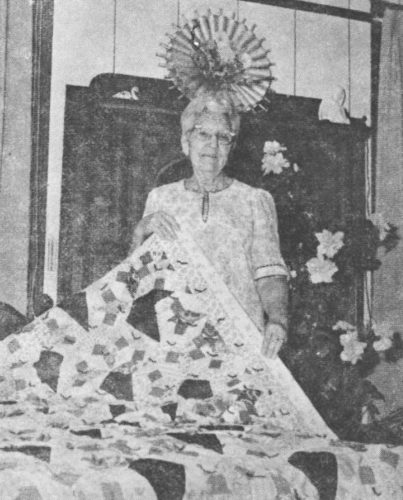
Perlie Brown was born near Samson, Al. in 1894. She moved to Freeport at age 19 and married Marion Brown. The had six children: Francis Mildred D’Amore, Marion Wilbur Brown, Ina Mae Garrett, Gladys Jones, Albert Marion Brown, and Mabel Caswell. The Brown’s made their living from the bay by hauling lumber and store merchandise on their sailboat from Freeport to Pensacola at a time when no roads existed between those cities. They also shrimped, oystered, crabbed, and sold bait to fishermen. They eventually bought a 90’ by 20’ two story houseboat, rented rooms, and started a fish camp. Perlie cooked meals for boarders in addition to helping her husband. In her spare time, she tended her vegetable garden, knitted, crocheted, tatted, and made ceramics. She died at the age of 88 in Freeport. Here is Ms. Perlie Brown’s interview:
How long have you lived here?
Since 1913.
What was this area like when you came here?
It’s nothing like it used to be. When I first come here, there were sawmills all over the place and turpentine stills. People were working all the time at turpentining or sawmilling. Fore years my husband and I would load the lumber on our sailboat and take to Pensacola to sell.
You’d go with him and help him do that?
Oh yes, I was the mate and we had one other crew member. We did that until the lumber and turpentine rant out. Then there was nothing for out boat to do so we hauled freight from here to Pensacola and from Pensacola back here. We didn’t have highways then. We’d bring a little freight on our boat and someone else would bring a little in their boat and we’d put it in the store. We did that for five or six years.
Did you move to this area with your husband?
No, I come here to visit my uncle. I met my husband and we got married two months later.
So where are you from?
Samson, Alabama.
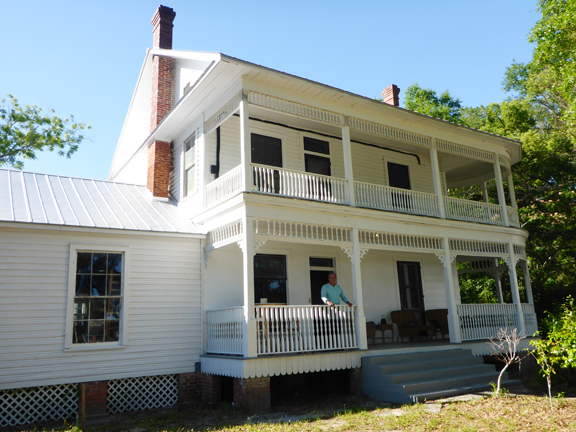
What years did you oyster and shrimp in the bay?
We oystered five or six years in the bay. We’d go out and find a bed of oysters. Nobody else would hunt them lie we did. We’d find a bed that would have just worlds of oysters. Then when you caught them all, you’d have to find another place. That was about the same way with shrimping. We were the first ones who ever caught shrimp out of this bay. It was hard work and you’d get nasty and muddy but I really liked to do it. Every time we’d pull a load up, it would weigh about forty or fifty pounds.
What kind of changes have you seen in the bay?
All the channels are different. And, they’ve got lights up and down the bay now. Back then you just had to know your way. Half the time you’d run aground. But now they’ve got the lights on the buoys and it’s much easier for people to get around.
You say the channels have changed. What do you mean?
The water made the channel and you had to know your way. But since they dredged it out, it’s straighter. It’s easier to run your boat. But now it’s really dangerous out there.
Why is that?
Well, when a storm comes up, what are you going to do out there on that boat?
Have you ever been caught in storms like that?
Yes, several of them.
In hurricanes or just heavy thunderstorms?
In bad storms, We were at Pensacola one time and had anchore our boat for the night Before daylight it was storming. My husband said we better set sail and on to Pensacola before it got too bad. I thought we were going to drown going across Pensacola Bay. But we made it all right. I don’t see how I did it. But I was right beside my husband.
Sounds to me like you’ve got lots of spunk and spirit.
Well, you had to have it.
When you were running the bay, did you notice the changes in the grass beds?
Yes. One time you’d go and see this grass growing and you’d sight your boat by it. An then the next time you went out it would be gone. I don’t know where it went.
Do you think there are as many fish in the bay now?
No, there’s not as many oysters, not as many shrimp and not as many flounder.
Do you have any idea whey that might be?
I’ve wondered about it. I wondered if the people killed all of them but I don’t know. I think they should have a time to flounder and a time not to flounder, especially when they’re spawning.
In other words, close it off when it’s spawning season?
Yes.
Did you ever fish after your husband died?
Oh yes, I fished nearly every night in the week floundering right by myself. Right by myself.
Just for fun or did you sell your flounder?
I sold them when I caught enough. I’d sell my fish to a store right up here. I’d take the wheelbarrow and load them up and take them to the store and sell them. I reckon I’ve floundered more than anybody in Freeport or in Walton County. Too, I fished more with a hook and line than anybody.
Have you even been out in a boat since then?
No. Since I’ve got older, my heart’s so bad I’m scared to get off my myself. That’s my biggest trouble, my heart.
So you and your husband did commercially sell your fish, shrimp, and oysters that you caught?
Yes. We’d sell all our fish and all our shrimp and oysters. We done that to try to feed our young’uns. Didn’t raise but six of them.
Harvey Casey
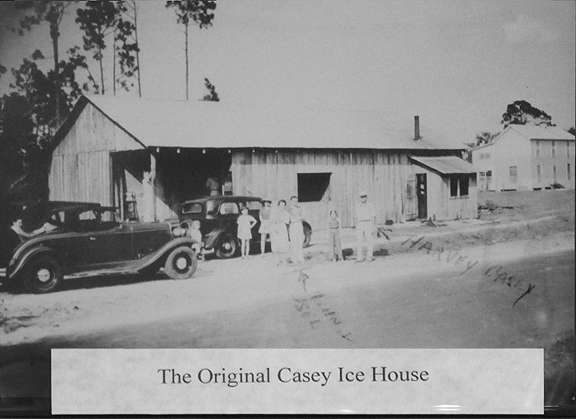
Harvey Casey was born on April 19, 1900 in Point Washington. He and his wife Abbie raised three children, Harvey H. of Winter Haven, Abby Schissler of Freeport, and Mary Catherine Hinton of Pensacola. The Caseys reside in Freeport where they help operate Casey’s Ice House, a family owned and operated business.
Casey interview:
Can you tell me a little about your life and your association with the Choctawhatchee Bay?
I was born on Choctawhatchee Bay in the big city of Point Washington. I lived there until I was five years old and we moved to Freeport and I’ve been around here ever since. My daddy ran the first motor boat across Choctawhatchee Bay. He carried the mail. He had a gasoline motor boat, one of the first three that came to Pensacola. My grandmother was raised over in the Point Washington area. Her husband, bill Mundy, came down from New York with the Army.
If the people wanted the bay to be a freshwater lake, it can be that. If they want it to be salt water, it can be that. Choctawhatchee Bay can be either. I remember when the flood came and they had to build a dam around the river in 1929. The water came down Choctawhatchee River and filled Choctawhatchee Bay with fresh water. That stopped the salt water from coming into the Choctawhatchee Bay. In other words, it was a freshwater lake. Around Choctawhatchee Bay you couldn’t see the beach at all. Round rush plants were growing higher than my head around the edge of the bay down as far as Four Mile Point on each side.
What kind of fishing did you do then?
Mostly freshwater fish, bass and bream. My daddy was floating timber at that time, floating logs to Spence’s Mill in Niceville. He ad a contract with them. Then this flood came and the tide rose so high in Choctawhatchee Bay and dropped in the gulf so low that the East Pass blew out. The sand all blew out and was about a half a mile wide and 12 feet deep. That water flowing in and out of Choctawhatchee Bay proved to us what we needed to bring our oysters back. An oyster needs a flow of salt and fresh water over it.
Before the flood, you did not have a lot of oysters?
No, we didn’t. When the tide turned salt water into the bay, there were oysters. This year we’ve had a pretty good oyster year for the simple reason that we haven’t had any rain. If we’d had a lot of rain last summer, you’d have that fresh water in the bay and you wouldn’t have as many oysters. That’s what those oyster thrive on, freshwater and saltwater tides coming over them every 24 hours. This bay at one time was filled with oysters. I don’t know how many tons of shell they dredged out of Choctawhatchee Bay. At one time, this bay had inlets. Instead of that being a peninsula, it was an island like those along the coast of Mississippi. But they filled up with sand like East Pass would if it was left alone. But if we wanted fresh water, we can get it back like it was. We could also make arrangements to get enough salt water circulating through Choctawhatchee Bay so that you’d have more saltwater fish and oysters in the bay. To do that, you’d have to keep East Pass open more or cut a channel in the head of the bay. That’s what we need.
You’d like to see the bay more salty?
Absolutely. For freshwater fishing, we’ve got Choctawhatchee River and lakes. When this salt water came in and killed all the rush grass, it left a stubble on the bottomland. The stubble was covered with oysters. You could wade out about knee deep on the reef and get oysters as large as your hand. They were good scissorbill oysters. Of course, they would be kind of sandy sometimes. But a lot of people ate them. We’ve had pretty good oystering this winter in Choctawhatchee for the simple reason that we’ve had more salt water. That is exactly what we need. Years ago when the Indians were here there was a lot of salt water coming into Choctawhatchee Bay through these inlands. It’s been proven that the Indians ate the oysters because of shell beds around Hamilton. That’s proof they were carried out there and opened.
When the flood water built up in the bay, what happened?
People around Destin will tell you that it happened in about an hour or two. They said that went out of there a terrible roar. It took that sand in that pass and carried it out into the gulf. It gradually drifted back in with the waves later and filled the pass back up again.
The river flooding caused the bay to flood?
Yes. I’ve seen Choctawhatchee River water as far down as Mary Esther.
How could you tell if it was river water?
It was yellow, muddy like the river. There wasn’t much water coming through East Pass then.
Do you remember people mullet fishing on the bay?
Yes. I’ve seen the time at night when you could go floundering and you’d get out in the bay and mullet would jump in the boat. But today you hardly ever see a mullet jump.
What’s causing them to die off our move?
Years ago we had roe season. I believe it started in September or October. The mullet were plentiful and Japan was paying about $10 a pound for red roe out of the mullet. The price go so interesting to the fishermen that they closed the roe season and only let them catch them when they had no roe in them. They’ve never closed that season again. The reason our mullet are gone is they’re bot being allowed to reproduce like they should.
You said the grass used to be very plentiful around the bay?
Yes. You could get in a boat out there in the bay and you couldn’t see the land at all. You could see the top of the trees, but the rush grass was all you could see around the edges.
Do you know of any other kind of grass that exists in the bay?
The moss grass is coming back around the mouth of the river.
How long have you had your ice house here?
We put the first little ice plant at bear Creek in 1934. Daddy put it in and I traded him out of it and moved it here in 1936. We just drifted into the seafood business with the ice business.
Do you sell fish that people catch?
Yes, but just what is caught locally. People will load a truck and ship it to Chicago and New York every now and then. The two or three times that I have bought fish off trucks I couldn’t eat it.
You don’t actually do any fishing yourself?
No. I’m not what you call a fisherman. Back when the bay was full of mullet, the Howell’s in Niceville for years were net fishermen and we also deep sea fishermen out of Destin. The daddy, Aaron Howell, did most of the net fishing and he had a big old gasoline powered boat that they lived on. But after they closed the roe in season, mullet fishing has been dropping off ever since.
Can I ask your age?
I was born in 1900 on the 19th day of April. I was 82 on the 19th of April, so my mother says, and she was there.
Jewel Melvin
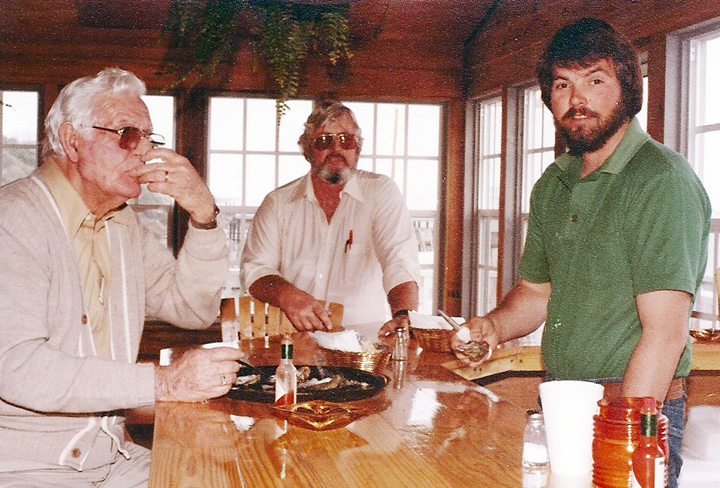
Jewel Melvin was born on August 17, 1907. He and his wife Ruby had found children; Joyce Fogle, Peggy Davis, Jewelene Thrasher, and Catherine Ward. He opened Captain Jewel Melvin’s Seafood Restaurant in Destin, and two of his daughters operate it today. Captain Melvin is retired.
Captain Jewel Melvin interview:
Are you from Destin?
I’ve been here 65 years. I came here when I was ten years old and I’ll soon be 75.
Did your family start a business down here?
Yes, we were in the fishing business.
Was it charter fishing or commercial?
There were no charter boats back then. In those days it was all commercial. All the fish we caught in those days had to go to Pensacola. They had freight boats to carry them over there. Then They’d bring back ice and groceries for the few people that lived here. There’s been a lot of changes since I’ve been here. Back in those days the outlet from Choctawhatchee Bay went through here.
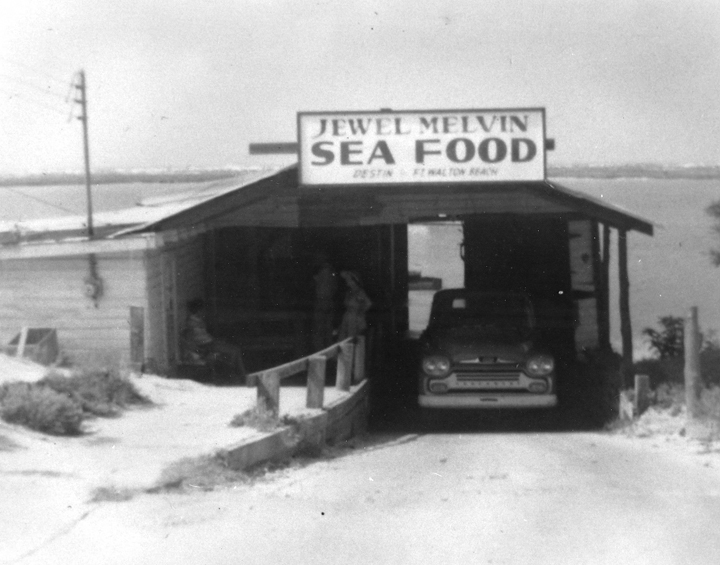
Where the Holiday Inn is?
Right in that area. It was a natural bar, an outlet. At that time we never did dredge it. Wind coming from the southeast would shift sand and fill it up. Coming from the southwest it would move it back. The bar shifted. That’s why we’ve always had the problem of deep water here. If we had the right kind of jetties, it would maintain about 20 or 25 feet of water. As it is, it doesn’t maintain even eight feet of water. The bay has moved at lease a couple of hundred yards in my lifetime. The 1926 hurricane knocked down all the timber.
Boats use to come in here and anchor and the water was nice and pretty and green out there. You could see the bottom.
Have you heard of any drastic temperature changes, or the possibility of an old oil well in the bay?
I don’t know anything about the hot water, and if they ever drilled a well it must have been at night.
What was the bay like before the pass broke through?
Years ago there used to be a lot of bull rush all over the bay. We had worlds of ducks and all kinds of other water birds before that Pass broke through. When that Pass broke through, salt water killed all that bull rush. From Indian bayou to Point Washington.
So Choctawhatchee Bay was pretty much a freshwater bay?
It was a brackish bay. The salt water down here would back in when the tide came in for about a mile up the bay. Then the fresh water would meet it. If there were any fish in that tide drift, they’d go crazy and run up on the beach. When the tide turned out, we’d go along the beach and pick up menhaden and use them for bait. But now that tide goes further back up the bay since this channel opened up.
You think that killed off the oysters?
We used to have a lot of oysters between here and Fort Walton. On this side of Joy’s bayou there used to be several good oyster bars. But it killed all that off. In 1975 when we had that hurricane and the tidal wave hit, it killed the oysters all the way to the head of the bay. Those oysters have never been right since. Choctawhatchee Bay was noted to have the best oysters along the bay. But everything has changed in the last forth or fifty years.
What type of fishing did your family do?
We always fished in the gulf. Back in those days the most popular fish was poor man’s fish, or mullet. A lot of people fished in the bay with nets and they salted their mullet because they didn’t have ice. Then we’d take them up to Alabama and Georgia and peddle them. They had peddlers come down to the fish house and buy them. A lot of people did that. But we fished in the gulf all the time. Back then we had 18 or 20 be seine rigs here, and one in the bay. Since the highway was put through here, the lights and the fumble of the outboard motorboats have scared fish off. We don’t have the fish here like we used to have because everything is lit up. Fish don’t like lights too much; it scares them.
Were there many boats here then?
We only had about 12 to 15 boats. But now we’ve go 150 big charter boats that go in and out of here every day. Besides that, we have 400 or 500 outboard motor boats that go in and out during the summertime.
Did you ever stick your head under the water and listen to an outboard motor run?
Yes, I have. And that’s what stirs up the fish. That did away with a lot of our fish. In 1932, we had a hurricane that killed all the bottom life between here and Panama City and Cap San Blas. The fish have never come back. Just like the blight that killed the sponge at Tarpon Springs in 1935 or ’36.
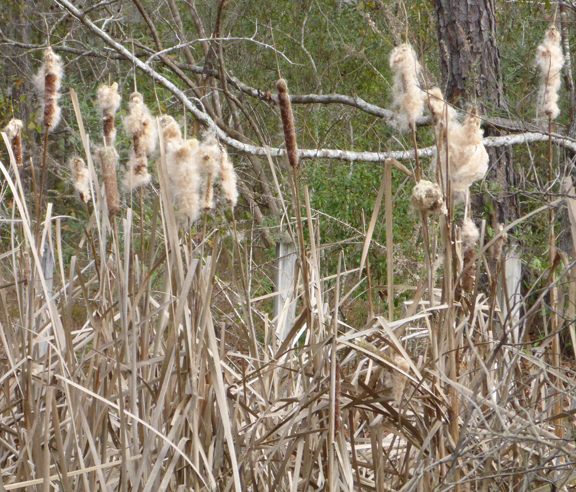
Do you’re saying it ripped up the grass beds?
The grass beds were in the bay, not the gulf. There are two spots left in the bay that have some grass, right across from the Coast Guard station and Fort Walton beach. But the salt water has killed part of that. Years ago, if it hadn’t been for the fish and the oysters, there would have been a lot of people going hungry because there was nothing else you could do. What little logging being done was down at Point Washington and at Freeport. And years ago when I was a boy they had old sailboats that would haul freight from Point Washington and Freeport to places like Pensacola. That’s the way we all lived until the modern times.
When were Highway 98 and the bridge built?
That was all public works under Roosevelt’s program. He built a lot of bridges and a lot of roads. The bridge was started around ’32. The first people who came here were from Vincennes, Indiana. They had a contract on the bridge and were going to build it in eight months.
Eight months?
It took six years. Those people weren’t used to any tides. They had built railroad trestles. But when they got here, they couldn’t hold their barges in position with the swell and the tide changes as strong as they are.
Do you remember when or how that pass was cut through?
We had a big flood in the bay and the Old Pass wouldn’t take care of it. Water was up and just about going over the land.
It wasn’t very wide to begin with, was it?
People took hoes and made a trench across there and water started running. The more it ran, the bigger it got. And when that thing busted, it was like a clap of thunder. I wasn’t here at the time, I was out fishing when it busted through and didn’t know it. When I came in here at night that tide just took me right back out in the gulf. I didn’t know what was going on until daylight.
You used to fish at night all the time?
The fish run at night. I haven’t caught a red snapper though since 1950.
Why is that?
Well, I went into the wholesale and retail fish business.
So you started buying instead of fishing?
Yep. I didn’t have time to go fishing.
When you had your business, you bought from the commercial fishermen that fished out of here?
Yeah, we bought about all the fish that came in.
Do you buy from the folks who come down here and fish on charter boats and don’t want their fish?
Eighty-five percent of the people that come here catch a lot of fish. They sell them to the dealer. It used to be that before they could sell their fish,, the state had a law that they had to have a $35 license. But that faded away. If you had a big fun of king mackerel, people wasted them. They catch them and then throw them away. What the State ought to do is put a bag limit on the tourists. Say, they could catch five king mackerel apiece. But they want to catch a whole pickup body full then dump them all out between Crestview and the State line. For the last couple of years we haven’t had the king mackerel to throw away. Nowadays I understand they’re using oa lot of seines to catch king mackerel and they’ve just about destroyed them. Mackerel are funny fish, whenever he hits the webbing, he dies. They’re beginning to use quite a few seines in Panama City, St. Joe, and up and down the coast.
Do these fish migrate?
Yes, you have two seasons for mackerel yearly. Different types of fish come in here together in the spring of the year.
If the temperature and the weather isn’t right they’ll travel the southern route. But they all wind up in the Mississippi River. I think that’s where they do their spawning, the that marsh and grass. You can catch king mackerel and Spanish mackerel just about year ‘round because the gulf stream runs in that area. We’re almost 200 miles from the gulf stream, so that makes the water get mighty cold here. In the fall, all the crabs will start coming out of this bay and go back into the gulf. Then in September all the mackerel and bluefish will turn back and go east and south. Sharks do the same thing. There will be acres and acres of sharks going back.
So, basically, when are the two seasons?
April through November is the best time of the year. And December through March is not very good fishing.
What did you do in the winter and when the fishing was bad?
Most of the people provided for that. They’d mend their nets and work on their boats.
Did you do a lot of shipping of fish form southern Florida for people up here who wanted them?
Yes. I shipped fish all over the United States when I was in the fish business. We’d sell some to the cafes and the rest we’d ship. I shipped most of them to New York. We had trucks coming through twice a wee, on Saturday and Tuesday.
Would they sell to the restaurants in New York?
Restaurants and hotels. Ad a lot of Canadian people go to New York to buy their fish.
Are there still shrimp in the bay?
You can’t get many shrimp here anymore. There’s not enough water in the bay.
Did they ever catch a lot of shrimp in the bay?
I’ve seen them catch lots of shrimp in the bay. But, I don’t think a fisherman ever catches all he wants to.
When you went out fishing, how many people did you take with you?
Six to eight men.
What size was your boat?
About 40 feet, the 45, and then 50. We’ve got some boats now that are 55 feet and have a lot of horsepower. When we used to snapper fish, we had a compass and sounding lead. Nowadays they’ve got radar, Lorans, and all kinds of electronics.
Did you have a favorite fishing spot where you knew the fish usually were?
Years ago, we did. Nowadays they make artificial reefs.
One an average how many fish did you usually catch and bring in?
We stayed out snapper fishing about three days back in those days and we’d catch five to ten thousand pounds.
You’d salt them and keep them?
Yes. That’s just like curing your pork years ago. You had to salt your pork down and cure it and then smoke it. That’s the same way we did with the fish.
How was it here during the Depression?
Actually, during the Depression we did all right because we had plenty of fish and plenty of port. One thing we didn’t though was plenty of clothes. Also, my wife and I went seven years without mailing a letter.
You didn’t have a mail service?
We had a post office and a mail boat. We just didn’t have the two cents to mail a letter. We married in 1929. That’s when the crash hit. We came in here with en thousand pounds of mackerel and a fellow offered us ten cents a pound. A thousand dollars back in those days was a lot of money. We took them to a fish house and unloaded them. We didn’t get our money because we were going back to get some more fish. That night in 1929, the crash hit. The next morning when people woke up, they didn’t have any money. All the banks were closed.
Can you tell me anything else about the bay?
Yes. Let me add this. Choctawhatchee Bay doesn’t have a great rise and fall in the tides. Panama City and Port St. Joe is about four to six feel while this bay produces size inches. The tide table changes right along Port St. Joe. And you don’t get fish in the Choctawhatchee bay at all. We used to have a lot of bluefish and mackerel in the bay but we don’t get them any more. And we used to have a lot of these big blue catfish in the bay. Back in the ‘40s we’d catch a million tons of them and they sold well. But now we don’t catch them at all.
Is this piece of property where you’ve been the whole time?
Yes. We had the fish house here and the boats. We built this restaurant out of cedar and it’s a little over a year old.
Walter Spence
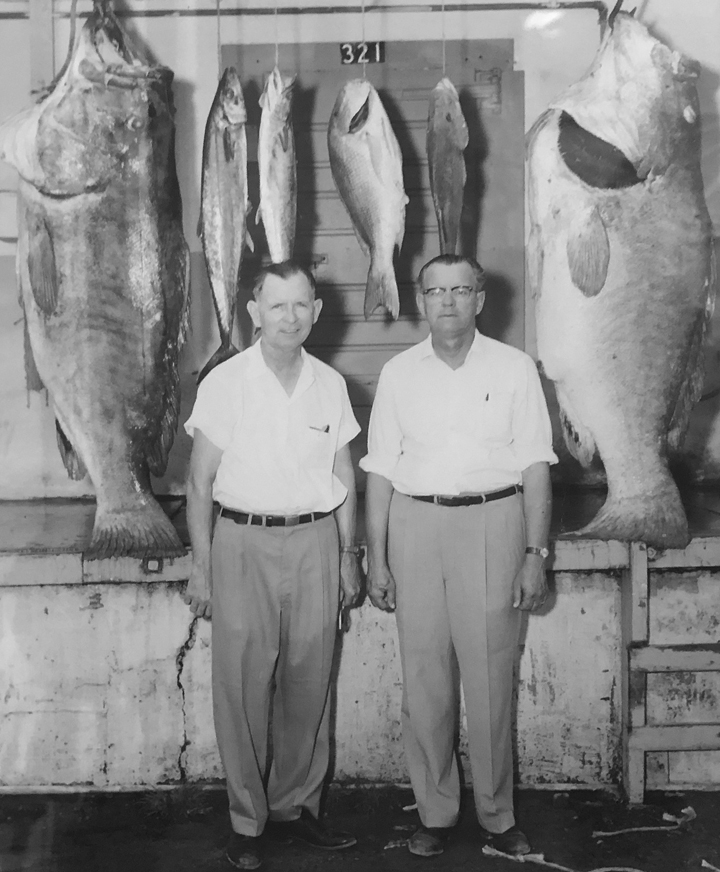
Walter Spence was born on September 22, 1901, one hundred yards from where he lives today at the head of Boggy Bayou which is now Niceville. He and his wife Elizabeth had two children, Frances and Gerald. His occupations included sawmilling, turpentining, and dairy farming. The Spence family is probably best known as the proprietors of Spence’s Fish House. They also own Spence Brothers’ Properties, Inc., a Real Estate firm. Walter Spence was also a politician, serving as County Commissioner for 28 years.
Walter Spence interview:
Has your livelihood always been associated with the bay?
I grew up in a sawmill and we got a lot of our logs up the Choctawhatchee River and towed them down to the mill. The mill was right down here at the point.
Where would you cut most of your trees from?
We cut lots of them near Black Creek above Freeport.
So you family is from this area?
My father came from DeFuniak as a young man and my mother was raised here.
Did your father start the mill?
No. My father was just a young man when he got a job here. Then he got to be manager of the mill. He cut a lot of time down on the sound.

And they shipped it all the way back?
We put logs overboard down there. We’d chain and spike the logs together and wait for the tide to come in. We it did we’d move them out of there and get a tugboat to tow them.
So you just towed all the logs to the mill?
We had a boat up the river and we’d cut lots of them near the creeks. Back then, there were no chain saws. We cut them down with a cross cut saw.
What was the size of the average tree?
Back then, they cut the best. About 12 inches a the top was average.
Mostly pine trees?
Yes, mostly pine, and once in a while a few cypress. Most of that stuff was cut up in ties.
When you would go to the Pensacola area to cut trees, how long would it take you to float them back here?
It would take a couple of days, depending on weather conditions. Sometimes, when the weather was rough, it would treat the logs loose and scatter them on the beach. Then we’d have to pick them all up.
I bet you lost a lot of logs.
No. We never lost too many.
How long was the mill there?
That mill was running there when I was born. I’ll be 81 on the 22nd of September, 1982.
When did it go out of operation?
About 1933. It’s been over 50 years.
What did you do after the mill closed?
I got married and bought about 75 cows. It was a full time job. I fooled with that about 12 years. In the meantime, I was asked to run for County Commissioner. I didn’t think I would be enough votes, but I said I’d try it. I beat this man by eight votes. I was Commissioner for 28 years. I promised I’d build a road across from the village of Destin to Joe’s Bayou. I didn’t have nothing but a grader. In my lifetime there have been three bridges built there.
Were they washed out or were they just putting in new bridges?
Just putting in new bridges.
Do you remember when there was a bad storm and the pass broke through?
I remember. It was kind of like it started off this year. It rained every day. The river came up and there was no outlet to the gulf except up at the sound. The tide didn’t come in there like it does now. It kept raining and before you knew it, there was more water in the bay than it could hold. O.T. Melvin lived at the end of the bridge in Destin and he decided he’d take his crew over there and cut through and enhance the worth of his property. He just did it on his own. Ever since the, it’s got a little big bigger and the dredge it every year. They still used that other Old Pass until it filled up.
How did you get started in the fish business?
I told my brother if we’d catch some fresh mullet out of the bay, we could salt them and crate them in hay. My father had a small feed house that he had torn down except for the platform decking. I told a fisherman to bring my brother and me 3,000 pounds of mullet. We got 11,000 pounds instead, and they piled them on that platform. We didn’t have coolers or ice so we cleaned and packed fish for 48 straight hours. We paid two cents a pound for the mullet and sold them for four and a half cents a pound. After that, we built slowly, buying boats and trucks as we could until we had what you see today.
What kind of changes have you noticed? Do you think that the bay life is coming back?
There’s more mullet now than there was when they put that DDT spray out for mosquitoes. It’s been 30 years ago. It killed the mosquitoes but it killed the little fish too.
What was the bay like then?
It was mostly fresh water. Naturally when they opened that pass up and the salt water came in here, it made a difference. I’ve seen them get great big bass around these bayous. You could take a hook and line and pole and catch as many bream and bass as you wanted. After a month of the salt water you would see the fish with their heads out of the water. They looked like they were suffocating. It was no time before they were piled everywhere. Salt water is what killed the freshwater fish. And it killed all the grass that was growing. Now there’s no grass there. It’s all sand.
What do you think about the possibility of building a bridge or causeway across the bay?
It’s got to be. There’s no other way.
Are you saying that because of the traffic problem?
I think it would help the fish business and also the tourists.
Floyd and Howard Suggs
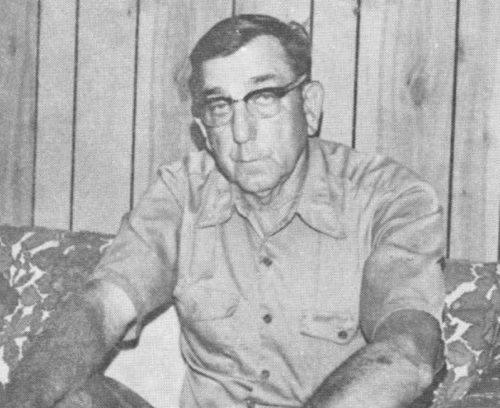
Floyd Suggs was born on February 12, 1908 and grew up in Freeport. He and his wife Alma, raised one son, Howard. Howard, 58, and his wife Jacqueline, also reside in Freeport. They have three children, Diane, Rhonda Sue, and Janet. Both Floyd and Howard Suggs are retired.
Floyd Suggs and son interview:
Have you lived here long?
Suggs: Yes, I’ve lived here all my life.
Is your family from the Portland area too?
Suggs. Yes.
What did they do?
Suggs: Back then we had a little sawmill and turpentine business. Until Eglin was built there wasn’t much here. It built this whole area up.
What did you do?
Suggs: I commercial fished and sold them at Spence’s Fish House. Then worked at Eglin as a ranger for many years. I got hurt and retired.
In your lifetime, what changes have you seen in the way of sea life and grasses around the bay?
Suggs: The biggest trouble we have not is not enough salt water in Choctawhatchee Bay. It’s better this year than it’s been the past because they dredged East Pass out. It helped a lot because this year we had lots of oysters. We have plenty of shrimp too. But we don’t have very many mullet. Whe I commercial fished, there were plent of fish here.
It the bay itself?
Suggs: Yes.
What kind of fish did you usually catch?
Suggs: Mullet and trout.
What that mostly in the head of the bay or was it all over?
Suggs: All over the whole bay.
What about the grass beds? Have you noticed any difference?
Suggs: Oh, yes. There used to be grass all up and down the bay. We don’t have that anymore. No grass at all. At the head of the bay, where there’s fresh water, there’s a little grass there.
Do you think it’s the salt water that caused the grass to die out?
Suggs: Yes, that was before they dredged East Pass out and before the canal going to Panama City. It used to fish all the way to Panama City through this canal, and that tide would be so strong we’d lay over until it changed and went back the other way. Now it don’t do that.
Do you think it’s because of the pass?
Suggs: Undoubtedly; my boy is a shrimp fisherman and he goes to Panama City to shrimp. He tells me that the tide will meet about half way in that canal and then it will turn back the other way. If it is, that water is not going all the way through.
You were here when they had a lot of heavy rains and floods. Do you remember that?
Suggs: Oh yes. We’ve had several of those floods but that one particular on blew out that pass.
How long were you in the fishing business?
Suggs: Off and on until this year. When I went to work with the government I had two boats that I sold. It got to where I couldn’t make a living. You can’t now, not up here. All they’re catching is just a few mullet, a few trout and a few flounder.
What about the oysters:
Suggs: There are a lot of oysters this year. Oystering is good.
When there we grasses in the bay, did you notice what they looked like?
Suggs: Yes. Particularly one, a round grass. There was a lot of that in the bay. Then there was another one, a flat grass that we called “flag grass.” I don’t remember the name of the round grass.
Was it like a reed type?
Suggs: Yes, it was about as big as your finger. It stood about three feet above the water.
The salt water killed it?
Suggs: I think the salt water did kill it.
Do you think it would be beneficial for this area to close the pass up and not have the salt water come in or do you like the salt water?
Suggs: I like the salt water. We just haven’t got enough of it.
Why do you say that?
Suggs: When we get one of these floods it takes it so long for the fresh water to get out of there that it just about kills all of the oysters and runs the fish away. We need another canal to run across to the Gulf where we could get plenty of salt water in here.
Like at Point Washington?
Yes.
Do you think the salt water has caused there to be a lot less mullet and less trout in the bay?
I don’t think that’s the trouble. We don’t have enough salt water in here and the mullet that we used to catch are not here. The trout are not here like they used to be either.
If there were another pass opened up, do you think that might increase the fish population as well as the oysters?
Yes, I sure do.
Do you feel that same way?
Son: I believe if we had more salt water coming in the bay it would help. We don’t have the fish that we used to have.
You know they put those jetties down at East Pass. Some of the older fishermen say that when the fish would start in they’d hit the jetty, and turn and go out around the end of it. I know last winter I was going to Apalachicola through what we call “the canyon.” I noticed a jug floating about midway through. That jug never did get out of that canyon. It would be towards West Bay one time and when you’d come back, it would be towards Choctawhatchee. That was an indication that the water never did flush all the way through.
Is West Bay more brackish or is it pretty salty?
Son: It’s pretty salty. You see, the pass is right there. The further you go through that canal, the saltier the water. But that’s what I was telling you while ago, that the tide used to run all the way through there but it won’t anymore.
How long have you been shrimping?
Son: I’ve been commercial fishing since I’ve been big enough to fish. I’ve been shrimping about five or six years. In the past, the people in this area depend on commercial fishing for their livelihood. You could drive down Highway 20 and it was nothing to see four or five bats out in the bay fishing commercially to raise their families. Now you might see a small rig and that’s all. Now there’s not a commercial rig around here. Not a one left in the Choctawhatchee Bay.
So what does Mr. Spence do? Does he just mainly buy from the small fishermen?
Oh, yeah. He buys from the shrimpers and what few fish he can buy.
When you would leave here to fish, would you leave for three or four days at a time?
Yes, we’d leave her sometimes on Monday morning and it would be Saturday or Sunday morning before we came back in. We’d salt most of the fish. When we started in we’d be able to catch some and run them in fresh for Spence’s down there. But you wouldn’t catch enough no to pay for your gas.
It’s hard to believe that things have changed that much. It’s not that large a span of time.
You couldn’t even pay your grocery bill now if you were commercial fishing.
Do you thank shrimping is improving or is that phasing out also?
Son: I don’t know. Last year we had a good season. But that’s the first one we’ve had in several years. This time last year I could come up that bay and rag my tri-net and get 50, 60, or 70 in a 10-minute try. I caught four shrimp yesterday and I tried from about 7:00 or 7:30 until 11:00 o’clock. That’s all I caught.
Suggs: You can take a 500-yard net and can’t catch a mess of fish with it. In the past I could take my cast net and go down on that beach and in just a few minutes have all I could cook.
Son: I drug 15 hours running and I had 62 pounds of shrimp. You can’t survive on that. You can make a three-hour drag and you’d average six, seven, maybe eight pounds. You burn six to seven gallons of gasoline an hour and I burned 90 gallons of fuel catching those few shrimp.
Do the oysters look like they’re going to be good this year?
Son: That’s hard to tell. Last year was the first good season for oysters we’ve had in years.
Suggs: Yeah. As I said awhile ago, we got more salt in the bay right now that we’ve had in there in years.
Son: Last year was the first time that I have ever caught rock shrimp at Choctawhatchee Bay bridge or ever hard of them being caught up there. I caught them in the tri-net last year. That was unusual. Now we catch them at the lower end around the pass. We had a mighty dry year last year.
Have you caught any rock shrimp here this year?
Son: I caught about 14 shrimp. That’s how many shrimp I’ve caught this year.
Suggs: We just don’t have the little shrimp that we usually have.
Son: Choctawhatchee Bay is open 12 months out of the year and it’s drug 12 months out of the year. Some people won’t do anything else but shrimp and if they’re too small and they can’t sell them, they’ll rake them overboard. Some of them disagree on having a closed season. They opened up last week. And Apalachicola is closed. I shrimp down there too. You can pull anything down there big enough to pull. It’s closed for scallops, I guess.
Son. Yes. But something definitely needs to be done. Either close the bay or have a closed season. You see, when they close Mobile bay, all the boast come in here. And with so many boats it does not take long to clean out a bay. I imagine there’s 50 shrimp boats in Choctawhatchee Bay right now. That’s not counting the little boats. Everybody that has an outboard motor has got a shrimp boat. Somebody’s dragging the bay 12 months out of the year. You can take a barrel of money and you just keep taking out and after awhile the barrel’s gonna be empty.
Have you ever tried to get the Department of Natural Resources legislation through to have the bay closed?
Son: I talked to them in Panama City. They stay on top of it.
Suggs: I actually believe that if we had a closed season it would help a lot.
Son: They say n Pensacola they’ve got a bumper crop. A fellow called me from Pensacola this morning. One boat got about three and a half boxes last night.
Wonder why they have such a good crop.
Son: They got a situation over there that they stay on top of. If they catch them with shrimp too small to catch, they’ll stay there on them and make them stay out of it.
What kind of fines to they levy:
Son: Different amounts; it varies with the offense. They allow you five percent of your total catch to be undersized.
Suggs: You’re allowed so many small mullet too. You’ll get some of them, you can’t help it. The same way with the shrimp.
We were taking about the grasses. How far out did they grow?
Suggs: A hundred or a hundred and fifty yards to two hundred yards. We don’t have that round grass anywhere in Choctawhatchee Bay.
Can you think of any other changes that might have occurred in the bay?
Suggs: There’s a lot of points that’s washed off and it’s a lot different than it used to be. And, a lot of the beaches have washed off.
Son: It might help if they would go back in there and clean out that canyon because it’s getting where you can hardly get through there. It’s filling up and washing in all the time. Suggs: Like I told you, we would go up there and sit until that tide changed and then make some time going through there. But now, it’s just a stand of water; it does not move.
Son: I believe it would help it.
Suggs: I know it would.
So it hasn’t been dredged out since it was dug?
Suggs: No. They’ve dredged in some places but they’s never dredged it all the way.
Have you heard of any temperature changes in the bay?
Suggs: When I saw that in the paper, I thought, well that will kill the fish. I did hear a report that it could be oil wells, but there’s never been one drilled in the Choctawhatchee Bay. I’ve lived here all my life and I would now if it had been drilled in here. They did put a little test wells all out here on the land. So it’s got to be something else but I don’t know what.
Well, I just appreciate your time. I hope your shrimping gets better.
Son: I hope so too.
